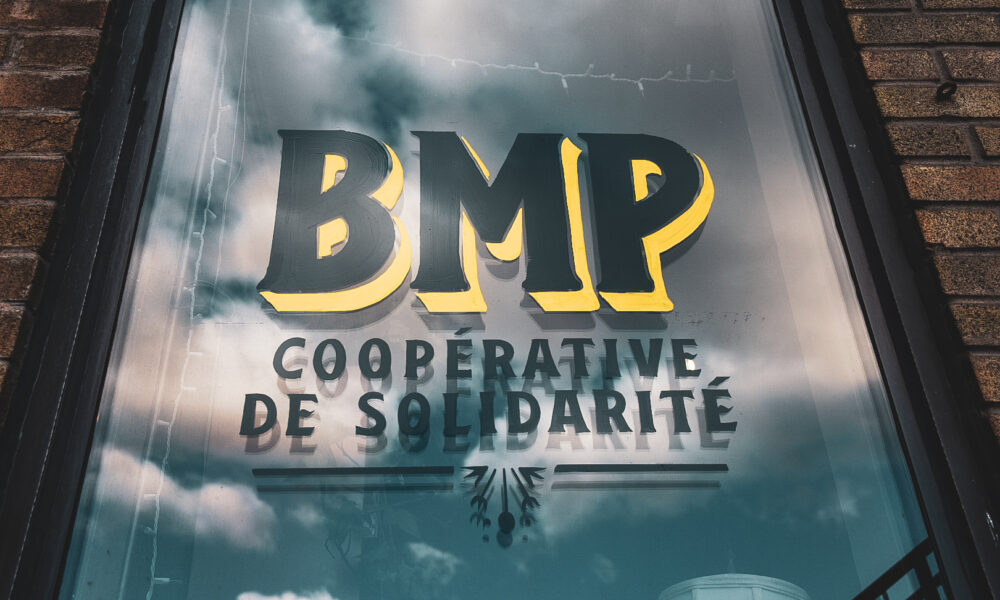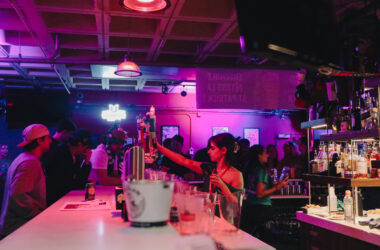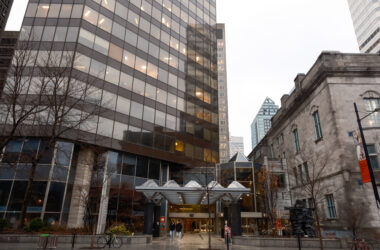On Oct. 21, organizers with the Quebec Public Interest Research Group at McGill (QPIRG) hosted a Radical Walking Tour, stopping multiple times along Avenue du Parc, Avenue des Pins, and on McGill campus to offer a critical presentation of both the university and the Milton-Parc neighbourhood. QPIRG is a student-run collective that seeks to engage students with the Montreal community and with social justice issues.
The Radical Walking Tour is one of the many events of Culture Shock, QPIRG’s annual free fall programming series on “anti-racism, migrant justice, and Indigenous solidarity.” The Students’ Society of McGill University (SSMU) also provides organizational support for the event series.
The tour began at QPIRG McGill’s Office and Alternative Library, which shares a space with the headquarters of the Milton-Parc Citizens’ Committee, a grassroots collective working to preserve the neighbourhood’s spaces and its residents’ rights. Carl Bystram, Working Groups and Community Research Coordinator at QPIRG, spoke to the importance of showing McGill community members the history of the neighbourhood.
“We find that situating people in the wider community around Milton-Parc and explaining the struggles that have happened here, as well as the broader struggles around McGill […] really fits in well within the Culture Shock agenda,” they said.
This site of intergenerational community and collaboration set the stage for the first half of the walking tour, which focused on the activist history and ongoing projects in the Milton-Parc community. The tour’s speakers described Communauté Milton Parc (CMP), the largest co-operative development (co-op) in North America, housing over 1,000 low- and moderate-income individuals in its 616 residential units. The tour guides explained how the CMP substitutes the conventional system of landlords charging rent for profit with a participatory housing arrangement, where residents support building maintenance and governance to cut down on rent-related costs for tenants. Further, the tour stopped at Co-op Bar Milton-Parc, a separate co-op that occupies commercial space from the CMP and acts as a bar and a solidarity space for community events.
Other Milton Parc resources spotlighted throughout the tour included food bank programs such as St. John’s Lutheran Church, Santropol Roulant, the Climate Justice Hub, and independent social-justice publisher Black Rose Books. The tour then moved onto McGill campus, starting at the Sylvan Adams Sports Science Institute (SASSI)—a construction project commenced in 2022 upon a donation of $29 million CAD from billionaire Sylvan Adams.
Speakers on the tour criticized McGill’s choice to partner with Tel Aviv University on the SASSI project due to its development of Israel’s genocidal killing of Palestinians and the Dahiya doctrine for bombing civilian infrastructure.
McGill’s Media Relations Office (MRO) did not provide comment to The Tribune on McGill’s partnership with Tel Aviv University.
The Radical Walking Tour continued by passing the New Vic Project site. There, speakers discussed the MK-ULTRA experiments which took place at the site in the 1950s and 1960s—a project where the CIA performed research on mind control and brainwashing techniques on unconsenting patients, many of whom were Indigenous. Speakers went on to highlight McGill’s ongoing legal battle with the Kanien’kehá:ka Kahnistensera (Mohawk Mothers) to search for unmarked graves they believe are on the grounds.
The tour concluded by pointing out sites on campus where student demonstrations have transpired, including the Bronfman Building—which students blocked on Feb. 22 to call for McGill to cut ties with Israel—and the spot where a statue of James McGill stood until July 2021, which students had long demanded to be removed.
The MRO affirmed the university’s commitment to social justice in light of founder James McGill’s enslavement of Black and Indigenous peoples and participation in the transatlantic slave trade.
“In the 200 years since its establishment, McGill University has evolved to become a world-class institution of higher education marked by pluralism and diversity,” the MRO wrote in a statement to The Tribune.
For SSMU Vice-President External Affairs Hugo-Victor Solomon, the tour’s focus on lived experiences beyond McGill promotes important avenues for community development.
“By participating in Culture Shock, we’re extending the invitation to SSMU membership at large to […] make connections that they wouldn’t otherwise make, and to be sensitized to issues that may really resonate with them that they haven’t had the chance to learn about yet,” Solomon said in an interview with The Tribune.









